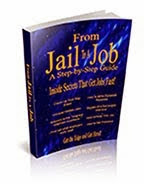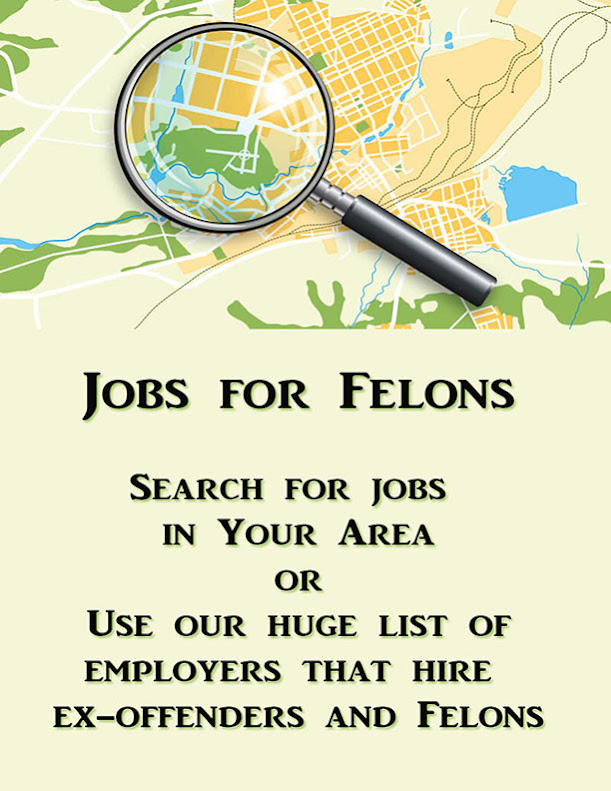Jobs for Ex-offenders and Felons: How to Get a Job
Jobs for Ex-offenders and Felons: How to Get a Job
Jobs for Ex-offenders and felons: Criminal Records
 The absolute first thing I tell my students is to get a copy of their criminal records. Somewhere in the job search the question of having a record is going to come up, either on an application or when a background check is done. I encourage my students to be totally honest whenever questioned about a criminal background. To do this, you must know exactly what is on your criminal record.
The absolute first thing I tell my students is to get a copy of their criminal records. Somewhere in the job search the question of having a record is going to come up, either on an application or when a background check is done. I encourage my students to be totally honest whenever questioned about a criminal background. To do this, you must know exactly what is on your criminal record.The easiest way to get an accurate copy or your record is ask your parole or probation officer. They are in position to get this for you. If you do not have a probation or parole officer, you can get one from the FBI. The FBI will provide the most accurate criminal background check available. You can get more information on getting this copy here:
https://www.fbi.gov/services/cjis/identity-history-summary-checks
There is an 18.00 fee for this report, but if you do not have the money an you can prove that you are indigent, you can receive this report for free
Jobs for Ex-offenders and felons: How Ex-offenders and Felons Can Find Jobs
The second suggestion I make to my students is to take a trip to the local One-stop Career Center. This used to be called the employment office. Here you will found a long list of services that can help you get a job. There are computers that you can use to apply for jobs online and put together a resume. If you do not know how to build a resume, you can get help doing this. There are interview skill building classes and other classes that can get you ready for a job. You will find a list of open jobs in you immediate area. There are also counselors available that can assist you in your job search. All of these service are free of charge. You can find the nearest One-stop Career Center at the link belowhttp://servicelocator.org
Jobs for Ex-offenders and felons: Networking to find Jobs
Perhaps the most powerful method of finding a job is networking. Networking is simply contacting people you already to find available jobs. Simply talk to people you know and asking them if they know of any jobs that are open. This seems too simple, but this is how most people find jobs. Start with your friends, neighbors, church group, elected officials and others you come in contact with frequently.Jobs for Ex-offenders and felons: Get a Resume
I do not send my students out on a job search without a well written resume. A resume is a way to combine your skills, education, education and training in a neat package. A resume can sell you even when you are not around. If you do not have a good resume, I suggest you get help putting one together. As I noted above, you can get free assistance with your next resume at you local One-stop Career center.After you get a resume, keep plenty with you wherever you go. You never know who you are going to meet. Always be prepared.
Jobs for Ex-offenders and felons: Get Dressed to Find a Job
Anyone looking for a job, not just ex-offenders and felons, should understand the power of making a great impression. Nothing does this better than a nice outfit, clean shoes and nice hairstyle. All of this should add up to an appearance that looks professional. Your look should say, "I am the person for this Job." Felons get hired everyday. They stand a better chance of getting the jobs they want when they look like they are worthy of the job. Employer want to feel like they re hiring quality people.Men should wear a dark suit or sports jacket with a light colored shirt and a color coordinated tie. You always wear a pair of shoes that could be and should be shined. Never ever wear boots or sneakers to an interview.If you do not have a suit definitely wear light shirt. Make sure your clothes are cleaned and pressed.
If you shave, make sure you are cleanly shaven. If you wear a beard or mustache, make sure it is neat and trimmed.
The best look for women is a suit with a knee-length skirt or pants and a light colored blouse. Be sure to to wear natural looking pantyhose. The best shoes are neat looking pumps with heels that are not too high. Make up should not be heavy and avoid bright colored or black nail polish. Keep jewelry to a minimum. One necklace, one ring, one bracelet per wrist and earrings no larger than a quarter.
Shower on the day of the interview. Just use a fresh smelling soap. Avoid cologne or oils. You don't want to chance a negative reaction. Do not eat or smoke before your interview. Be sure to brush your teeth. Your breath should be fresh and your teeth clean.
Do your absolute best to look like a professional on your interview. Looking like a professional will show respect four yourself, the interviewer and the opportunity to interview.
Practice Interviewing
The best thing you can do prepare for an interview is to practice. Practice your body language and posture. Anticipate the questions that the interviewer might ask and come up with good answers to those questions. Practice answering the questions but do not memorize them. Practice them until they sound natural. Get someone to pose as the interviewer and record your practice interviews.
Always us appropriate language when interviewing and never use slang. Listen carefully and be sure to answer every question completely but do not talk too much. Be prepared to talk about your criminal record but don't focus on it. Instead, focus on what you have done to improve yourself.
Nothing takes the place of preparation. Practice until you feel confident and you will do well.
Jobs for Felons: Ten Tricks Interviewers Use
Jobs for Ex-offenders and felons: How to Get a Job
Companies Hire Felons | Companies That Hire Felons | Companies That Hire Ex-offenders | Employers That Hire Ex-offenders | Employers That Hire Felons | Jobs For Felons | Jobs For Ex-offenders | Jobs That Hire Felons | Resumes for Felons | Felon Friendly Jobs | Felon Friendly Employers | Jobs for Felons | Jobs For People That Have Felonies | Jobs For People With A Criminal Record
Eric Mayo

















